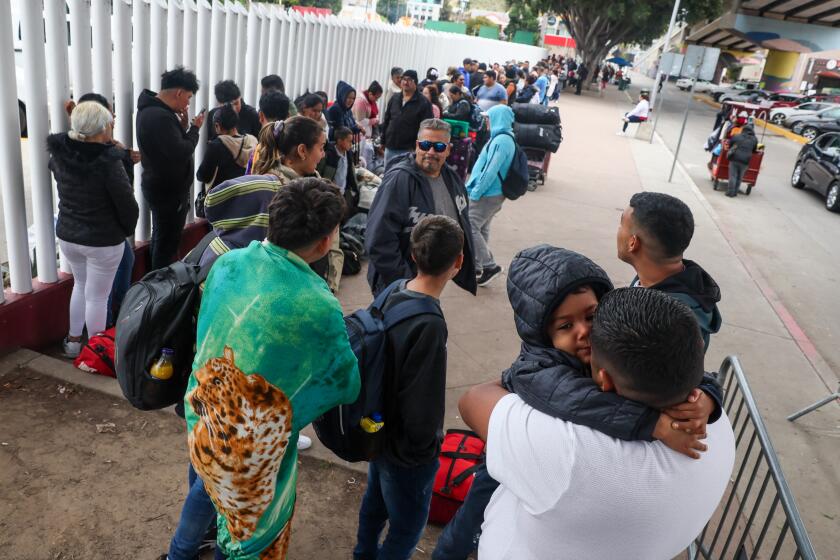Illegal Immigrants Receive a One-Way Ticket to Mexico
The first repatriation flight of Mexicans caught illegally crossing the Arizona border landed here Monday evening, kicking off a new deportation program that could return thousands of border crossers deep into Mexico.
U.S. officials say using planes to ferry Mexicans home -- rather than dropping them off at the border -- will save lives, keep migrants away from smugglers and discourage repeated attempts at sneaking back into the United States.
But 20-year-old Hector Dimas, among the 138 migrants who disembarked from a chartered Mexicana Airlines flight, said the program would not quash his effort to return to work in the United States.
“I will be going back in 15 days,” said Dimas, who has worked in construction in Dallas for the last four years. “I need to work. The jobs in Mexico don’t pay anything.”
Seven of eight deportees interviewed in a half-hour period Monday said they would recross the border soon.
“I’ll try again in a month,” said 34-year-old Juan Mora, who was caught on his way back to his wife and two children in Richardson, Texas, after visiting relatives in Mexico. The landscape worker had made four successful crossings until this weekend, when he was arrested by U.S. Border Patrol agents.
Like Mora, the migrants who arrived here Monday had agreed to leave a federal detention facility in Tucson and take the free flight home.
Each chartered flight will cost U.S. taxpayers $28,000. As many as 300 migrants will be returned daily. By Thursday, the repatriation operation will include daily flights from Tucson to Guadalajara, as well as to Mexico City. Migrants agreeing to participate in the program will be given bus vouchers to take them from the airports to their hometown.
U.S. officials have pledged to avoid the use of shackles, restraints and handcuffs in transporting the migrants. On Monday, the deported migrants said they had received a meal of spinach pasta and soft drinks during the three-hour flight.
U.S. and Mexican officials say they hope the joint “voluntary repatriation” program will reduce the number of migrant deaths in the brutal heat of the Arizona desert this summer.
Mexican officials reported that 422 people died last year trying to enter the United States through California, Arizona, New Mexico and Texas. Arizona had the most fatalities. Through June 21, at least 148 Mexicans have died this year along the border in the Southwest.
Although they acknowledge that the program might save lives, migrant advocates say the U.S. is motivated by more than sympathy. They note that the Border Patrol recently launched an aggressive campaign to round up illegal immigrants.
Border Patrol officials say they hope the new repatriation plan, like several others over the last decade, will discourage illegal immigration by making it more expensive for the deportees.
“One of the main reasons is to drive up the cost of crossing again, to break the relationship between the migrants and their polleros, or traffickers, who typically include several tries in the prices they quote,” said Claudia Smith of the California Rural Legal Assistance Foundation, a migrant advocacy group based in Oceanside.
“It remains to be seen what percentage of the thousands caught at the border each week will opt for a free ride home,” said Wayne Cornelius, a professor and immigration expert at UC San Diego. “But bus tickets are cheap in Mexico, and even from the southern part of the country it should cost only about $100 and take two or three days for the average migrant to get back to the border.
“Determined, economically motivated migrants will not be deterred from trying again until they succeed,” Cornelius said.
Critics say previous repatriation programs have failed because they were costly and could not be shown to discourage repeat crossings. The United States has approved $13 million for the current program to run through September.
Repatriation is a sensitive political issue in Mexico, and U.S. and Mexican authorities took months to agree on this program.
Before the migrants boarded the Mexicana flight, they were informed by Mexican consular officials in Tucson that the repatriation was voluntary, Mexican officials said. Because Mexican law guarantees freedom of movement within its borders, any forced repatriation would be illegal.
The Foreign Ministry here said in a statement that Mexico and the U.S. had agreed to the “deep repatriation” plan to “avoid [migrant] deaths and abuses committed by human traffickers.”
By some estimates, Mexicans account for up to 95% of all illegal crossings in the Southwest border region.
In the Border Patrol’s Tucson district alone, an average of 2,300 Mexicans have been detained every day since March, when enforcement was tightened, a spokeswoman for the Department of Homeland Security said.
Arizona’s lightly patrolled desert has become the favored point of entry for migrants and the traffickers who shepherd them since the Border Patrol made crossings along the San Diego County border tougher.
But the shift to Arizona carries enormous risks for migrants, especially during summer, when desert temperatures exceed 100 degrees.
Migrant advocates say the high death rate among crossers shows they are willing to accept those risks.
More to Read
Start your day right
Sign up for Essential California for news, features and recommendations from the L.A. Times and beyond in your inbox six days a week.
You may occasionally receive promotional content from the Los Angeles Times.






